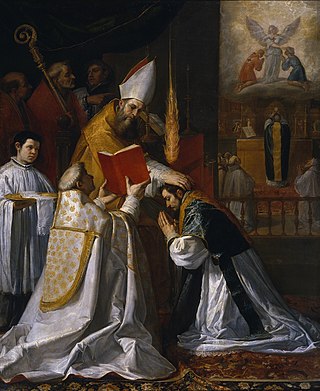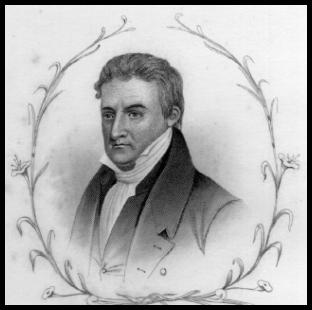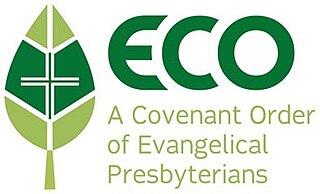
In certain Christian denominations, holy orders are the ordained ministries of bishop, priest (presbyter), and deacon, and the sacrament or rite by which candidates are ordained to those orders. Churches recognizing these orders include the Catholic Church, the Eastern Orthodox, Oriental Orthodox, Anglican, Assyrian, Old Catholic, Independent Catholic and some Lutheran churches. Except for Lutherans and some Anglicans, these churches regard ordination as a sacrament.

The Presbyterian Church (USA), abbreviated PC (USA), is a mainline Protestant denomination in the United States. It is the largest Presbyterian denomination in the country, known for its liberal stance on doctrine and its ordaining of women and members of the LGBT community as elders and ministers. The Presbyterian Church (USA) was established with the 1983 merger of the Presbyterian Church in the United States, whose churches were located in the Southern and border states, with the United Presbyterian Church in the United States of America, whose congregations could be found in every state.
Presbyterianpolity is a method of church governance typified by the rule of assemblies of presbyters, or elders. Each local church is governed by a body of elected elders usually called the session or consistory, though other terms, such as church board, may apply. Groups of local churches are governed by a higher assembly of elders known as the presbytery or classis; presbyteries can be grouped into a synod, and presbyteries and synods nationwide often join together in a general assembly. Responsibility for conduct of church services is reserved to an ordained minister or pastor known as a teaching elder, or a minister of the word and sacrament.

The Cumberland Presbyterian Church is a Presbyterian denomination spawned by the Second Great Awakening. In 2019, it had 65,087 members and 673 congregations, of which 51 were located outside of the United States. The word Cumberland comes from the Cumberland River valley where the church was founded.

The Presbyterian Church in the United States was a Protestant denomination in the Southern and border states of the United States that existed from 1861 to 1983. That year, it merged with the United Presbyterian Church in the United States of America (UPCUSA) to form the Presbyterian Church (USA).

The United Presbyterian Church in the United States of America (UPCUSA) was the largest branch of Presbyterianism in the United States from May 28, 1958, to 1983. It was formed by the union of the Presbyterian Church in the United States of America (PCUSA), often referred to as the "Northern" Presbyterian Church, with the United Presbyterian Church of North America (UPCNA), a smaller church of Covenanter-Seceder tradition at a conference in downtown Pittsburgh, Pennsylvania, in May 1958. Vigorous ecumenical activity on the part of PCUSA leaders led to this merger, something of a reunion of two long-separated branches of the larger Presbyterian family deriving from the British Isles.

The Presbyterian Church in the United States of America (PCUSA) was a Presbyterian denomination existing from 1789 to 1958. In that year, the PCUSA merged with the United Presbyterian Church of North America. The new church was named the United Presbyterian Church in the United States of America. It was a predecessor to the contemporary Presbyterian Church (USA).

Finis Ewing was the primary founder of the Cumberland Presbyterian Denomination on February 4, 1810.
James Wade Knight was a Cumberland Presbyterian minister. He served as that denomination's first Director of Ministry and was the Executive of Kentucky Synod.
Kentucky Synod was a synod of the Presbyterian Church in the United States of America established in the late 18th century. As a body, Kentucky Synod was a great deal more conservative than the Presbyterian Church as a whole — especially in its opposition to many aspects of the Second Great Awakening, a revival movement that thrived in Kentucky from about 1798 to about 1820. Synod suspended or deposed a number of revivalist Presbyterian ministers, but these men continued to preach to their former congregations. Eventually, Barton W. Stone, who abandoned Washington Presbytery in 1803, formed Springfield Presbytery, which eventually became the Christian Church. In 1810, ministers from the former Cumberland Presbytery, which had been dissolved by Synod five years earlier, left the church and created an independent presbytery which became the Cumberland Presbyterian Church.
The Cumberland Presbyterian Church in America is a historically African-American denomination which developed from the Cumberland Presbyterian Church in 1874.
Beverly St. John was an elder in the Cumberland Presbyterian Church and served as that denomination's first female moderator of the General Assembly in 1988. The Cumberland Presbyterian denomination had been the first Presbyterian body to ordain women as clergy beginning with Louisa Woosley in 1889. St. John also authored a collection of essays for parents of small children, As the Twig is Bent, in the mid-1960s, and co-authored a book of poetry with Rev. James Knight, "The Prophet is a Snow Man" in 1986.
Cumberland College in Princeton, Kentucky, was founded in 1826 and operated until 1861. It was the first college affiliated with the Cumberland Presbyterian Church. In 1842, the Cumberland Presbyterian denomination withdrew its support from Cumberland College in favor of Cumberland University in Lebanon, Tennessee. In doing so, the denomination intended to simply relocate the school from Princeton to Lebanon, but Cumberland College remained open without denominational support until the Civil War.
The Cumberland Presbytery existed from 1802 to 1806 as a presbytery of the Presbyterian Church in the United States of America, a predecessor to the Presbyterian Church (U.S.A.). The presbytery was strongly influenced by the Second Great Awakening and has an important place within the history of the Cumberland Presbyterian Church.

In Christianity, the ordination of women has been taking place in an increasing number of Protestant and Old Catholic churches, starting in the 20th century. Since ancient times, certain churches of the Orthodox tradition, such as the Coptic Orthodox Church, have raised women to the office of deaconess. While ordination of women has been approved in many denominations, it is still a very controversial and divisive topic.
Methodist views on the ordination of women in the rite of holy orders are diverse.

ECO: A Covenant Order of Evangelical Presbyterians is an evangelical Presbyterian denomination in the United States. As a Presbyterian church, ECO adheres to Reformed theology and Presbyterian polity. It was established in 2012 by former congregations and members of the Presbyterian Church (USA), abbreviated PC(USA). Denominational disputes over theology—particularly ordination of practicing homosexuals as pastors and gay marriage—and bureaucracy led to the founding of ECO. In 2018, ECO has over 383 congregations, 103,425 covenant partners and over 500 pastors. ECO churches are egalitarian in beliefs and ordain women as pastors and elders.

Presbyterianism has had a presence in the United States since colonial times and has exerted an important influence over broader American religion and culture.
This is a timeline of notable moments in the history of women's ordination in the world's religious traditions. It is not an exhaustive list of all historic or contemporary ordinations of women.










